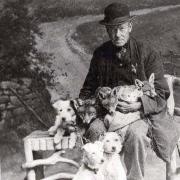Derbyshire Life meets Professor Kathryn Mitchell following her new appointment as Vice-Chancellor of the University of Derby

I MEET Professor Kathryn Mitchell on day two of her new appointment as Vice-Chancellor of the University of Derby. So the tall bookshelves are still waiting to be filled and the objects that personalise and familiarise an office are not yet installed. But there is an enormous and beautiful bouquet of flowers on the table, sent by Professor Mitchell’s predecessor, John Coyne: a warm welcome to Derby if ever there was one.
Professor Mitchell, formerly Deputy Vice-Chancellor of the University of West London, had been spending a couple of days a week in Derby in advance of starting the job, and comments, ‘There’s a lovely, friendly atmosphere when you come into this university. When I’d been interviewed, I said to my husband, “I hope I get this job. Because it’s me.” And I love the size of the city. I’m someone that likes to get out and be part of the community, and I hope people will come and stop me and say hello.’
Born and brought up in St Helen’s in Lancashire, she attended Notre Dame High School before going on to the University of York to read psychology. She confesses to having been ‘not a real slogger’ at school ‘but it was an environment where not a lot of people went on to higher education, so you were trained in a sense to go to university. That was a privilege in itself,’ she says, and means it. At the end of her course in York, she was – to her surprise – put forward for one of 10 scholarships being offered by the Wellcome Trust. She remembers ringing the Trust from a phone box and saying in panic, “I’m running out of money... Can you ring me back?”
Having been drawn to psychology out of an interest in people, she had expected to work on the social side of the discipline, looking at the social impact of behaviour. Instead, growing to like the underlying discipline of the scientific element, she went off to teach herself molecular biology and ended up a biological psychologist. ‘It was much more interesting to understand that everyone had this biological basis, and if you didn’t understand that, you were sort of guessing,’ she observes.
At the Institute of Psychiatry, she began research on a neurotransmitter project linked to Alzheimer’s disease, and as part of her post-doctoral studies, also went to the University of Chicago, where she worked with the Nobel prizewinning physiologist, Paul Greengard. ‘Strangely, when I’d done that, I wanted to get back to people rather than cells,’ she remembers. So it was back to London, to University College, to work with patients suffering from rheumatoid arthritis – ‘probably my favourite research project,’ she says with satisfaction.
Research is who she is, she reflects, very pleased that she is able to bring with her to Derby a project built around children with low esteem. She hopes that Derbyshire schools will be part of this national programme, ‘not only because community based projects are a good way to engage with the wider region but because the research of universities does need to impact on its local community, then regional, then national,’ she says with conviction. ‘Because Derby is such a community based institution, it lends itself quite well to that and this will be meaningful. But it’s very much about asking the communities what sort of projects they would like to engage with, rather than saying, “This is what we’ve got.”’
At the University of West London, she had special responsibility for academic provision and quality, and had previously held the senior positions of Pro Vice-Chancellor Academic and Student Support Services, and Dean of Students. Formative too have been the periods spent at the Rockefeller Institute in New York and the Friedrich Miescher Institute in Basel.
‘Working in the States was amazing but if we ever thought the UK was a competitive market...’ she says in wonder. ‘Within one lab at Rockefeller there were three teams, all in competition with each other and working on shifts that included an overnight shift. The team that won each week was the one that got the best results. Switzerland was very different: no-one was there after five o’clock but they were incredibly productive. You didn’t chat. You just got on with your work.’
Her first child was born in Switzerland, where she had the services of a midwife for three hours every day for a month after he was born. ‘Helped bath my baby, got me lunch...’ she says in awe and gratitude for the system. One of just 20 women Vice-Chancellors – there are 112 males in the role – she has no personal agenda on this issue but acknowledges that there is still some way to go before there is equality in the academic profession, where men continue to earn much higher salaries than women. ‘When people are looking for promotion, it looks such an enormous jump that females don’t apply,’ she suggests.
She had a good role model in her mother, who sadly died during the interview process for Professor Mitchell’s appointment. Her father died when she was very young and so her mother became the breadwinner, becoming deputy head of a grammar school in a very short space of time. ‘My role model was, you go and do,’ she says with a smile reflecting, ‘There are two elements to women in senior roles. You can either still be the same person that you were or you can try and play a different type of role that may not be you.
‘I’m not in the role that says females should get the jobs. I came back into higher education after a significant break. But I did strategically keep the values I wanted. I still wanted to be with the children at home, however amazing my husband was – and he is. So I didn’t apply for jobs that would take me away. But now, with our second child going to university, it is a good time within my life pattern.’
She was attracted to Derby for the university’s broad student mix and strong links with industry and employment. Regional recruitment is high but more national recruitment would be beneficial and she is also keen to address the problem of graduate retention. ‘We don’t keep a lot of graduates in the East Midlands region,’ she reflects. ‘Getting graduate employment from Derby within the region would be one major thing we would be working on. And again, we want to look at employers’ needs, find out what they are looking for in these graduates. One of the key things is looking at formalised work placements in academic programmes, so that students do understand what industry is like within the whole region.’
The University of Derby has facilities that Professor Mitchell describes as ‘amazing.’ Once prospective students have seen it, they’re won over, so getting more of them to visit is something the marketing team are working on hard. ‘It’s about telling the story in a more strategic way too,’ Professor Mitchell suggests. ‘We have all these links with companies such as Rolls-Royce, where students may be able to get a placement and embed themselves in the region and that community. We have great research. Telling the story through a student’s eyes is going to be very, very powerful.
‘And we have to tell the story of the region and that it’s a great place to live. It’s a very healthy region – if you’re a graduate, you’re more likely to be healthy but if you come to Derby, you are more likely to be extra healthy! The diversity of the city and countryside is something extremely valuable and something not sold enough – we need to enhance that even more and show that you can be living in the most fantastic countryside but 20 minutes from a city with huge prospects.’
Students are the best ambassadors a university can have, she says with conviction: ‘So for me, it will be working very closely with the Students Union and being very visible to the student body. Because I think if they understand the mission of where the university needs to get to, they can be quite a voice, and also sell the region as well as the university when they leave. I want graduates to have a strength of conviction about their discipline and also the academic debate and language – it’s as valuable as being taught how to use Powerpoint and Skype. It means they can go and be international.’
She has a stunning panoramic view of the city from her office window. ‘Just look at that!’ she says with pleasure, delighted, as someone who likes walking, that she can walk from the university campus into the city. She’s very keen on theatre too, and looking forward to the artistic riches that both Derby and the wider region have to offer. And she likes to read – ‘fiction, but with quite a lot of history in it, so that I might learn something. My final ambition is to write a novel. But not today.’



























